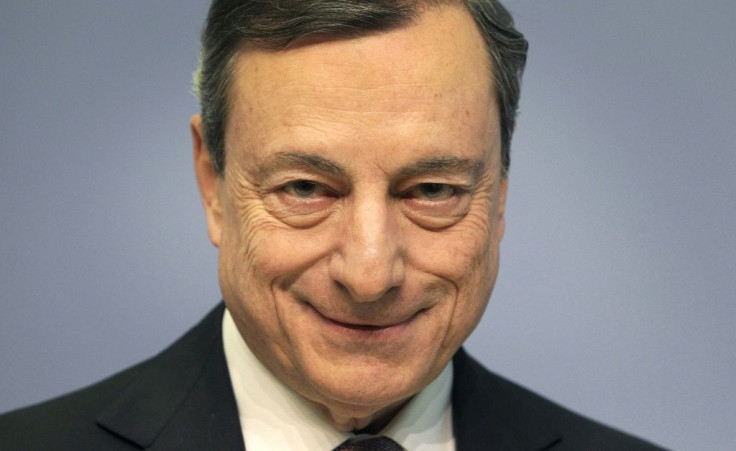Draghi Defends ECB Record On Critics' Home Turf

Former European Central Bank chief Mario Draghi on Friday received Germany's highest honour, defending his record after the award again fanned the flames of criticism of his easy-money policy.
Presenting the Federal Order of Merit at a Berlin ceremony, President Frank-Walter Steinmeier said Draghi had "rendered outstanding service to Europe, and -- I say this very deliberately -- performed a great service for my country."
"In stormy times when you yourself were often exposed to the wind, you kept the euro and the European Union together."
News the Italian economist would receive the medal prompted attacks from familiar quarters over his policies of low rates and "quantitative easing" (QE) -- mass bond-buying to flood the banks with cheap money.
Tabloid-style daily Bild blasted Draghi as a man who "deprived millions of German savers of their interest payments".
In his acceptance speech, Draghi painted his actions as part of a Europe-wide "stability culture," drawing also from Germany, "the country which stands at the heart of Europe".
That meant "a deep-rooted respect for the law, the rules and one's mandate... (that was) certainly a guiding principle of my presidency," he insisted.
A YouGov poll commissioned by business daily Handelsblatt found 60 percent of respondents did not agree Draghi should be honoured.
When Draghi lowered interest rates again last September, Bild had dubbed him "Count Draghila sucking our accounts dry", altering a photo to show him with fangs and a cape.
"Of course it is possible to criticise an independent central bank and its actors. But please, in a fact-based debate with respect and decency," Steinmeier said.
"I hope we will be able to overcome misunderstandings... between the ECB and the German public sphere."
Outside Germany, Draghi remains widely credited with saving the euro, notably with his 2012 promise to do "whatever it takes" to preserve the single currency at the height of its sovereign debt crisis.
Under Draghi's 2011-19 tenure, the ECB bought more than 2.6 trillion euros ($2.9 trillion) of bonds in a quantitative easing asset purchase scheme and pushed interest rates to historic lows.
The measures are designed to boost the supply of credit in the eurozone economy, stimulating growth and pushing inflation towards the ECB's target of just below two percent.
But in Germany, where many prefer to save for retirement rather than buy a home, the knock-on effects of slashing risk-free interest income on savings accounts were felt especially painfully.
"His monetary policy may have benefited some countries in southern Europe. But it did not benefit the eurozone and certainly not Germany," conservative MP Axel Fischer told Bild.
While he on Friday thanked German leaders like Steinmeier and Chancellor Angela Merkel -- also in the audience -- for their roles holding Europe together, Draghi did little to endear himself to the ECB's host country while in office.
The 72-year-old did not learn German during his time in Frankfurt -- unlike new chief Christine Lagarde, who said she took up study of the language immediately.
Lagarde also charmed locals by making a high-profile appearance at the city's new year's festivities this month, something Draghi never did.
Both Draghi and Steinmeier also highlighted the job falling on leaders like Merkel and Lagarde of extending and deepening Europe's economic and monetary union to make it resilient to future crises.
"You always named the challenges clearly," Steinmeier told Draghi.
"Monetary policy can only be one input to successful economic and financial policy. The decisive political decisions must be taken by elected governments."
Eurozone member states continue to debate issues like building up a common budget capacity, bank deposit insurance and other fundamental features of single currency areas.
"We need different policy areas to cooperate and to be mutually reinforcing," Draghi said, echoing his repeated calls while in office for governments -- including Berlin -- to complement the ECB's monetary stimulus with tax and spending policy and structural reforms.
© Copyright AFP {{Year}}. All rights reserved.





















